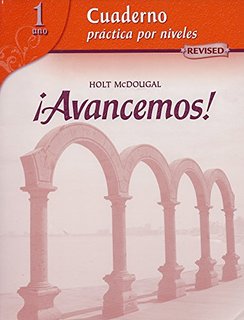
All Solutions
Page 298: Gramatica A
|Singular |Plural |
|–|–|
|Yo **-í** |Nosotros **-imos**|
|Tú **-iste**|Ustedes **-ieron** (Mexico)|
|Él/Ella **-ió**|Ellos/Ellas **-ieron**|
**Tip:** Remember that **the verb matches the subject in person and number.** This is how you will know which form of the verb to circle.
(Yesterday, Lorena lost the money in a shopping mall.)
Lorena is the subject and third-person singular, so we used the third-person singular form of the verb *perd**er** (to lose),* which is *”perd**ió**.”*
(The day before yesterday, Lorena and Carmen returned very late.)
The subject is they (Lorena and Carmen) and accordingly, we used the third-person plural form of the verb *volv**er** (to lose),* which is *”volv**ieron**.”*
(Ernesto and I went out to drink soda.)
The subject is we (Ernesto and I) and accordingly, we used the first-person plural form of the verb *sal**ir** (to go out),* which is *”sal**imos**.”*
(I climbed the stairs.)
The subject is first-person singular, so we used the first-person form of the verb *sub**ir** (to climb/to go up),* which is *”sub**í**.”*
(You saw the shirt you want.)
Here, the subject is second-person singular, so we used the second-person singular form of the verb *v**er** (to see),* which is *”v**iste**.”*
1. perdió
2. volvieron
3. salimos
4. subí
5. viste
**Tip:** Remember that **the verb matches the subject in person and number.** This is how you will know which form of the verb to put.
Look at the table below to see the endings for these verbs:
|Singular |Plural |
|–|–|
|Yo **-í** |Nosotros **-imos**|
|Tú **-iste**|Ustedes **-ieron** (Mexico)|
|Él/Ella **-ió**|Ellos/Ellas **-ieron**|
At what time did you (plural) go out of your house? (3:00)
– Nosotros **salimos** a las tres en la trade de mi casa.
*(We went out of my house at 3 o’clock.)*
The subject here is first-person plural (we), so we used the first-person plural form of the verb *sal**ir** (to go out),* which is *”sal**imos**.”*
What did Inés and Cecilia see? (shoes)
– Inés y Cecilia **vieron** unos zapatos.
*(Inés and Cecilia saw some shoes.)*
The subject is third-person plural (they), so we used the third-person plural form of the verb *v**er** (to see),* which is *”v**ieron**.”*
Where did Inés lose the money? (in a sports shop)
– Inés **perdió** el dinero en la tienda de deportes.
*(Inés lost the money in a sports shop.)*
Inés is third-person singular (she), so we used the third-person singular form of the verb *perd**er** (to lose),* which is *”perd**ió**.”*
Did you return to the shop to look for him/it? (Yes)
– Sí, yo **volví** a la tienda para buscarlo.
*(Yes, I returned to the shop to look for him/it.)*
The subject here is first-person singular (I), so we used the first-person singular form of the verb *volv**er** (to go out),* which is *”volv**í**.”*
**Tip:** Remember that **the verb matches the subject in person and number.** This is how you will know which form of the verb to put.
Look at the table below to see the endings for these verbs:
|Singular |Plural |
|–|–|
|Yo **-í** |Nosotros **-imos**|
|Tú **-iste**|Ustedes **-ieron** (Mexico)|
|Él/Ella **-ió**|Ellos/Ellas **-ieron**|
*(My aunt and Norberto shared the dessert.)*
The subject is third-person plural (they), so we used the third-person plural form of the verb *comprat**ir** (to share)*, and got *”compart**ieron**.”*
*(Later, she opened the presents.)*
The subject is third-person singular (she), so we used the third-person singular form of the verb *abr**ir** (to open)*, and got *”abr**ió**.”*
*(Finally, we returned home.)*
The subject is first-person plural (we), therefore, we used the first-person plural form of the verb *volv**er** (to return)*, and got *”volv**imos**.”*

